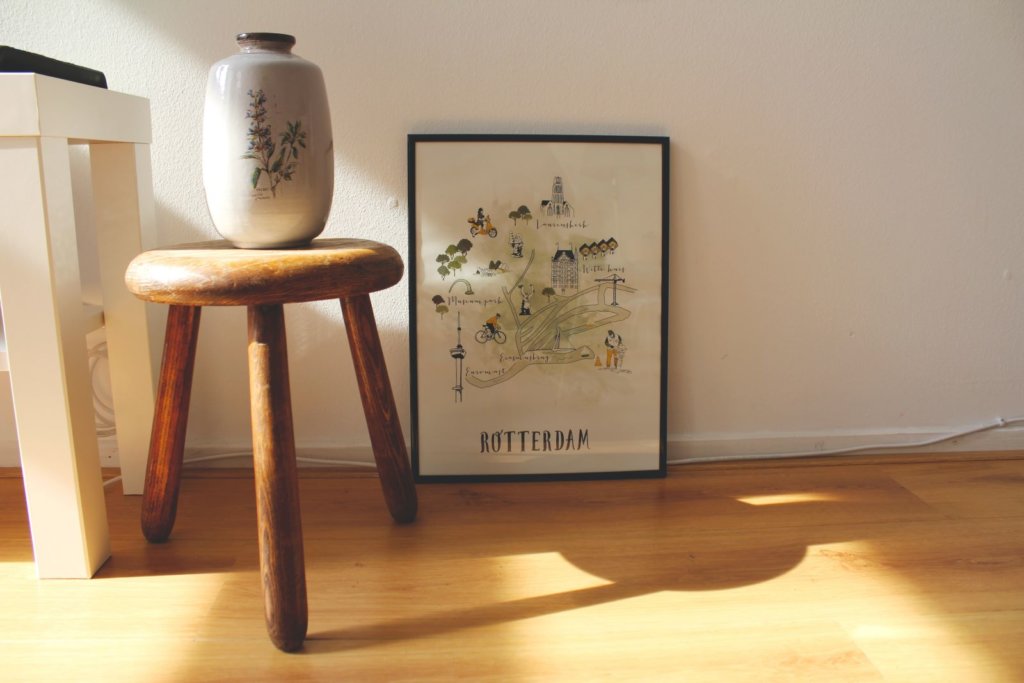The new year is typically when many people start to set resolutions of how they want this year to be. They want to change an aspect of their life or behavior. Resolutions abound such as: “I want to lose weight,” or “I want to make more money.” But how do those things actually happen? How can we make a change stick? After all, most people abandon their resolutions by February, and sometimes even earlier, so it’s clear that merely setting the intention isn’t enough.
My friend introduced me to a concept that’s blowing my mind a little called the Triad of Change. Think of the triad as a three-legged stool consisting of structure, behavior, and perception. You need all three for change to happen, but for the change to be long-lasting and sustainable, you have to start with the leg of the stool that’s most enlivening for you and end with the most draining part, otherwise, you’re sure to fail.

I like this picture because it captures both a stool and a feeling of movement with the poster in the background. Photo by John Boatile on Unsplash
Structure is the “where and how.” It’s budgets, plans, routines, etc. If you get excited by diving deep into the small details of life, start any change with structure.
Behavior is the “what.” It’s actions, activities, performance, etc. If it thrills you to just get out there and do something, start with behavior.
Perception is the “why.” It’s feelings, vision, purpose, meaning, etc. If you become animated thinking about how you want to feel, what you want to experience, or the big picture, start any change or decision with perception.
The triad of change is hugely relevant in my life right now because I notice I keep starting with my drain: structure. For instance, I’m flying to Australia soon, which is super exciting because the country has been on my bucket list for a long time. But instead of celebrating, I feel stressed and overwhelmed with all the details. “Should I book this Airbnb? What about that one? Would it be better for me to fly at this time or at this time? When should I plan the side trip to the Great Barrier Reef? Can I fit in a visit to Uluru?”
For some people, thinking about those details is enlivening. They clap their hands in glee wading through various Airbnb options. I am not one of those people. Making decisions from a place that’s invigorating for me, perception, means asking myself, “What do I want to experience?” and then going from there. I want to experience comfort so that means booking an Airbnb with air-conditioning. I also want to experience ease, and for me, that means being close to things, not in party central, but also not in the boonies. With that in mind, I found an Airbnb that meets my needs. I didn’t wade through 1,000+ listings or focus only on finding the cheapest place. I set myself up for success by honing in on what matters to me.
The Triad of Change concept is simple yet complex. I’ve found most of the literature about it online is esoteric, all of which is to say if you don’t understand what I’m talking about, you’re not the only one! You can message me if you want to talk about it in depth, but for the purposes of this post, it’s enough to ask yourself, “Which of the legs energizes me? What inspires me?” and then start from that place. You know what to end with by asking yourself, “Which of the legs drains me? What would I rather put off or outsource to someone else?”
Thus far this process is making my life easier and I have that wish for you too. Life is too short to feel drained all the time. Why not feel enlivened instead?
I dream of a world where we understand how to make a change stick. A world where we recognize the mechanisms that work for other people may not work for us. A world where we understand change doesn’t have to be hard or grueling, it can be easy and joyful. A world where we operate from a place that lights us up and we let that energy carry us through our days.
Another world is not only possible, it’s probable.
As we enter this new year, I keep thinking about envy. Not the way I normally do in that my chest burns with the emotion, aching to have what someone else does. Instead, I’m thinking about something my former therapist told me, “Someone out there envies you.”
When he first said that to me, I balked. “What?!? My platonic relationships are great, but don’t most people think that? Who complains that their friends are awful? Other than those relationships, how could anyone possibly envy me? I’m not wildly successful, I don’t have a boatload of money, I’m single, and I don’t even live in a large apartment! What is there to envy?!?”
The reason I said that is I was doing exactly what neuroscientists recommend you don’t do to feel happy – comparing up, or in other words, comparing yourself to people who are better off than you are. How did researchers come to this conclusion about comparing up and down? They studied a cohort that’s rife with competition and comparison: Olympic medalists. One study of the 1992 Summer Olympics found bronze medalists tend to be happier than silver medalists because bronze medalists think about how close they were to finishing without a medal at all. However, the silver medalists think about how close they were to winning the gold.

I tried to capture an image that was green with envy. Here’s what I landed on. Photo by Runze Shi on Unsplash
The researchers didn’t just ask people how they felt after the fact, they studied facial expressions and we saw real-time evidence of this disappointment with McKayla Maroney and her now-famous pout. In 2012, she was a crowd-favorite gymnast, expected to win the gold for her individual event. Instead, she made a mistake that caused her to miss the gold medal by one-hundredth of a point. She won the silver and disappointment was written all over her face.
It makes sense of course, but thinking this way, of what could have been and isn’t, what you missed out on, etc. is deadly, literally. Another study found silver medalists’ life expectancy is less than that of gold and bronze medalists and it’s posited this is due to the perceived dissatisfactory competition outcomes. These medalists were so upset about missing the gold, their lives became shorter. Yikes. So what’s the solution here? Compare down, and also maybe broaden your perspective.
I received a dose of perspective a few days ago. A woman whose career I’ve envied for a while isn’t doing so great personally. She got divorced and moved out of the home she bought with her spouse. When I heard the news, I felt pity. Instead of wishing I had this woman’s life, I felt grateful that I don’t. Yeah, her career success would be great, but I don’t want to experience what she does. Furthermore, to bring it back to my earlier comment, my relationships are healthy and fulfilling. I take it for granted that I love and am loved, but not everyone experiences that. In other words, I’m feeling the contentment my spiritual teacher advocates.
He says santośa, or contentment, means a state of proper ease. “Contentment is not at all possible if the individual is running after carnal pleasures like a beast. As a result of extroversial analysis, the objects of enjoyment go on increasing both in number and abstraction and that is why one’s mental flow never gets any rest. Under such circumstances how can one attain perfect peace of mind?”
They can’t, which is why contentment is so crucial. Santośa is not about being satisfied with the crumbs of life. It’s not appropriate to tell someone who is near-starved to be grateful for eating every three days. Everyone has a right to a full and respectful life, and at the same time, there’s something to remembering what we do have and realizing someone out there envies us.
I dream of a world where we spend more time practicing gratitude for what we do have instead of lamenting what we don’t. A world where we recognize if we saw the inner workings of other people’s lives, we wouldn’t want to trade places with them. A world where we practice contentment and compare ourselves to people who have less than us, not more.
Another world is not only possible, it’s probable.
- « Previous
- 1
- …
- 4
- 5
- 6